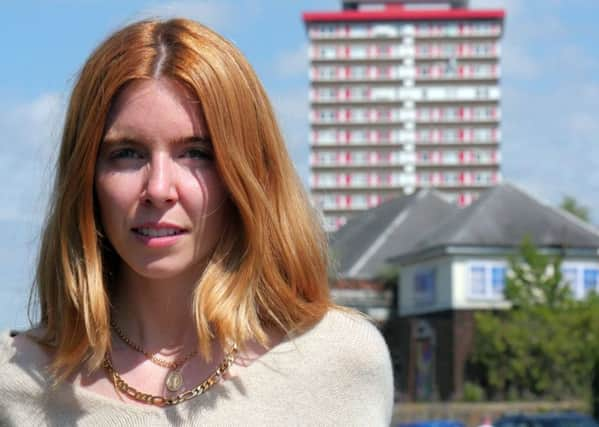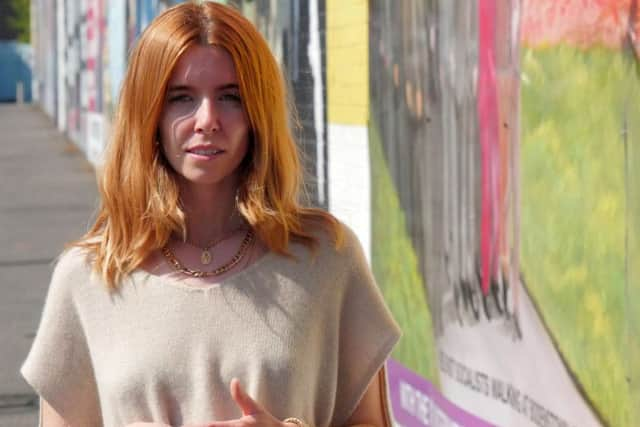'˜Paramilitary-style shootings measured and justified', republican gunmen tell Stacey Dooley in BBC documentary


The new documentary, produced specifically for the iPlayer-only channel BBC Three, sees broadcaster Stacey Dooley investigate the phenomenon of paramilitary-style shootings in Northern Ireland.
Focussing primarily on the Divis area of Belfast, she interviews community workers, several shooting victims, and a PSNI Detective Superintendent.
Advertisement
Hide AdAdvertisement
Hide AdShe also attends a “secret meeting” with four gunmen from an unidentified paramilitary group involved in carrying out the attacks.


After travelling in a windowless van to a secret location, she is filmed meeting four masked gunmen in front of a starry plough flag across from a table draped in the Irish tricolour.
The men can be seen holding what look like automatic rifles, while it appears that a pistol and ammunition have been placed on the tabletop.
Asked if they feel any guilt for carrying out the attacks, one of the men replies: “You dont feel guilt or remorse. It’s a social action. We have to stand up for the weaker members of the community.
Advertisement
Hide AdAdvertisement
Hide Ad“We want to help people. And if you have to shoot somebody to help people, well, we’ll do it.”
The masked man continued: “If we go to shoot someone, it’s not off a whim. It’s a calculated decision that this person deserves. We believe that if you have to cause a bit of pain, it’ll help in the long run. We believe that if you have to cause a bit of pain it’ll help in the long run. We might shoot some man who might feel a bit of pain for six weeks but he could be out robbing houses, joyriding, selling drugs to the community for 10 years.”
Accused of thuggish behaviour, and asked to try and justify it, the gunman replies: “We know we’re hurting people seriously but we’re hurting a parasite. You know, in an ideal society, no one wants to resort to violence to deal with issues.
“We do feel pressured into it a lot, and there’s a big appetite for it.
Advertisement
Hide AdAdvertisement
Hide Ad“We believe it is a justified and measured response. We don’t live in a normal society. This is how we deal with stuff.”
He continued: “We’re just normal men. There’s none of us out around acting gangsters with gold chains or cars.
“We could be living next door to your grandmother and that’s why people fear us so much because we just come out of the shadows, do our deed, and go home.”
Stacey Dooley also interviwed the PSNI Detective Superintendent Bobbie Singleton, who said the paramilitary groups were “lining their own pockets”.
Advertisement
Hide AdAdvertisement
Hide Ad“They have wanted to maintain their position and status within communities,” he said.
“They are organised crime groups now. They are exploiting people within their community. They live like parasites, you know, taking money off the local businesses. Anyone who tries to develop anything in the area, they’ll be involved in extorting money from them.”
The PSNI Detective Superintendent continued: “They’re also taxing drug dealers. So they might come out and say they’re taking action to keep people safe, but actually what they’re doing is lining their own pockets.”
He admitted the PSNI were finding it difficult to combat these type of crimes, saying: “One shooting and one beating is one too many. We are committed to trying to tackle it, but it’s proving really, really difficult, largely because of the lack of engagement that we get from victims and their families. And you can understand that.
Advertisement
Hide AdAdvertisement
Hide Ad“There’s no doubt about it, policing in some areas of Belfast, in particular, can be really challenging but there’s no such thing as a no-go area. We are up for going into those communities. We are up for criticism, we’re up for the debate because we are there to serve people. We’re there to be held to account as well and if we’re not delivering, we want to hear about it.”
The documentary also featured an interview with Joanne McGibbon, a mother-of-four whose husband Michael died at the age of 33 after he was shot by republican paramilitaries in north Belfast in April 2016.
Asked about the shooting, she said: “I can remember wrapping my whole body right around his leg because the blood was pouring everywhere, and I could see the bullet on his ankle.
“I could see he was going into arrest, I just knew it. I said ‘I’m going to do CPR, I’m going to do CPR to keep him alive’. I had it all planned out in my head, and the next thing he looked up in the sky. He was so happy, I’ll never forget it. He had a big smile on his face, and I just knew he was going. He was peaceful.”
Advertisement
Hide AdAdvertisement
Hide AdPresenter Stacey Dooley also spoke with community activists in Belfast.
Chris Turley, a community worker in the Divis area, said: “Like any working class area we have our challenges. People here are turning to paramilitaries and the reason that we are seeing that is happening is that there is a failure at times, on behalf of policing, to actively do the job that they’re meant to be doing in these areas.
“On a daily basis I’m listening to people saying they’re reporting crimes to the PSNI. They’re not responding for two or three hours, or at all, which then leaves people to go ‘if I can’t go to the police, and I’m not being left alone, where do I go?’”